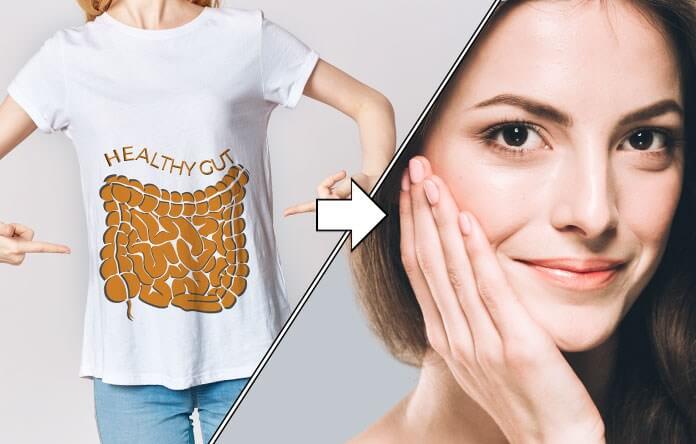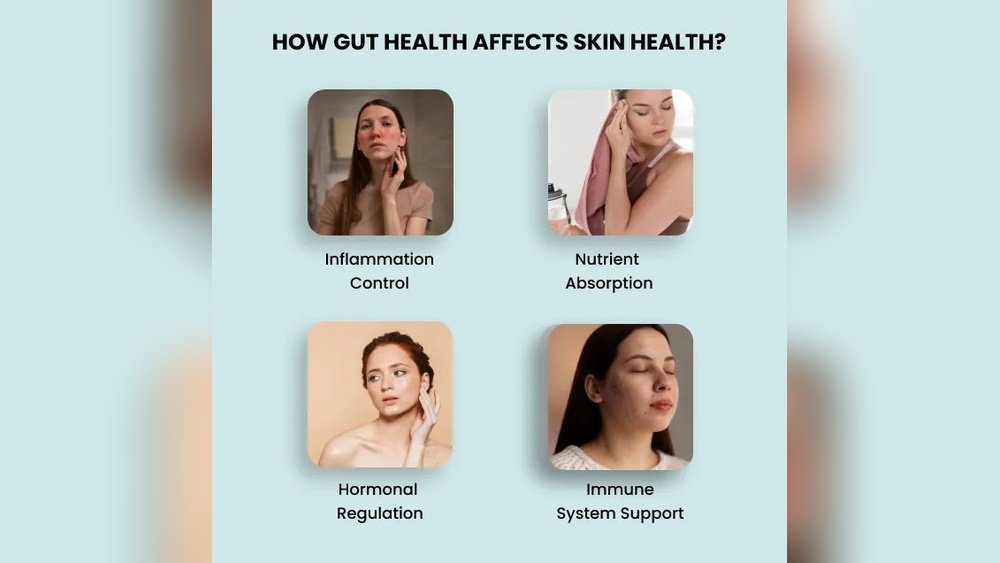Have you ever wondered why your skin sometimes breaks out or feels dull, even when you’re using the best skincare products? The secret might lie deeper than your bathroom shelf—right inside your gut.
Your gut health and facial skin are more connected than you might think. When your digestive system is out of balance, it can trigger inflammation and skin issues like acne, redness, or dryness. Understanding this gut-skin connection can help you unlock clearer, healthier skin from within.
Keep reading to discover how nurturing your gut can transform your complexion and what simple steps you can take today to glow naturally.
Gut-skin Axis Basics
The gut and skin share a unique and powerful connection. This link, called the gut-skin axis, shows how digestive health impacts skin condition. Both organs communicate through the immune system, hormones, and bacteria. Understanding this relationship helps explain why gut problems can lead to skin issues.
The gut contains trillions of bacteria that balance the digestive system. When this balance is disrupted, it is called dysbiosis. Dysbiosis can trigger inflammation, which often appears on the skin as acne, eczema, or redness. Healthy gut bacteria produce substances that calm inflammation and support skin repair.
What Is The Gut-skin Axis?
The gut-skin axis describes the two-way communication between the gut and skin. Signals from the gut influence skin health and vice versa. This connection involves the immune system, nervous system, and microbial communities in both areas. Changes in gut bacteria can affect skin inflammation and appearance.
Role Of Gut Microbiota In Skin Health
Gut microbiota are the bacteria living in the intestines. They help digest food and produce important compounds like short-chain fatty acids. These compounds reduce inflammation and strengthen the skin barrier. A balanced gut microbiota supports clear, healthy skin.
How Dysbiosis Affects The Skin
Dysbiosis means an imbalance in gut bacteria. This condition can cause the immune system to overreact. The result is chronic inflammation that shows on the skin as acne, rosacea, or eczema. Fixing gut imbalances often improves these skin problems.
Immune System’s Role In The Gut-skin Axis
The immune system acts as a messenger between the gut and skin. It detects harmful bacteria and sends signals that affect skin cells. A healthy gut helps the immune system keep skin calm and protected. Poor gut health can cause immune responses that harm the skin.

Credit: drsajjas.com
Role Of Gut Microbiome
The gut microbiome plays a key role in the link between gut health and facial skin. It is made up of trillions of bacteria living in the digestive system. These bacteria help digest food, fight harmful germs, and support the immune system.
When the gut microbiome is balanced, it can reduce inflammation in the body. This balance helps keep the skin clear and healthy. An imbalanced microbiome, called dysbiosis, can cause skin problems like acne, eczema, and rosacea.
The gut microbiome produces important substances such as short-chain fatty acids (SCFAs). These SCFAs help control inflammation and protect the skin’s barrier. A healthy gut means fewer skin irritations and better skin hydration.
How Gut Bacteria Affect Skin Health
Gut bacteria influence skin by regulating the immune response. They help the body fight infections and heal wounds faster. Good bacteria also keep harmful bacteria in check. This balance reduces the risk of skin breakouts and redness.
Impact Of Dysbiosis On Facial Skin
Dysbiosis occurs when bad bacteria outnumber good ones in the gut. This imbalance causes inflammation that shows up on the skin. Skin conditions like acne and eczema often worsen with dysbiosis. Restoring gut balance can help improve these skin problems.
Microbiome And Skin Barrier Function
The gut microbiome supports the skin’s barrier, protecting it from toxins and allergens. A strong skin barrier locks in moisture and keeps irritants out. When the gut is healthy, the skin barrier stays intact and resilient.
Gut Microbiome And Collagen Production
Some gut bacteria stimulate collagen production in the skin. Collagen is essential for skin firmness and elasticity. A balanced microbiome can slow skin aging and reduce wrinkles. This keeps the skin looking youthful and smooth.
Common Skin Issues Linked To Gut
The gut and skin share a strong connection. Problems in the gut often show on the skin. This link is called the gut-skin axis. Many common skin issues relate to gut health problems. Understanding these issues helps manage skin better.
Acne And Gut Imbalance
Acne often happens due to gut bacteria imbalance. Harmful bacteria cause inflammation inside the body. This inflammation can lead to clogged pores and pimples. Poor digestion and food sensitivities also trigger acne. Fixing gut health may reduce acne breakouts.
Rosacea And Digestive Disorders
Rosacea is a skin condition with redness and bumps. Many people with rosacea have gut issues like small intestinal bacterial overgrowth (SIBO). This gut problem increases inflammation that affects the skin. Treating gut disorders often helps calm rosacea symptoms.
Eczema Linked To Gut Flora
Eczema causes dry, itchy, and inflamed skin. It is connected to an imbalance in gut microbes. When the gut barrier is weak, toxins enter the body. These toxins trigger skin inflammation and eczema flare-ups. Improving gut flora can ease eczema discomfort.
Psoriasis And Gut Inflammation
Psoriasis is marked by red, scaly skin patches. Chronic gut inflammation plays a role in psoriasis development. A poor diet and gut dysbiosis worsen this inflammation. Supporting gut health may reduce psoriasis severity and skin irritation.
Dry Skin And Poor Nutrient Absorption
Dry skin can result from poor gut health. Gut problems reduce nutrient absorption like vitamins A and E. These nutrients are essential for skin hydration and repair. Healing the gut improves nutrient uptake and skin moisture.

Credit: mazillo.com
Diet And Probiotics Impact
Diet and probiotics play a key role in the connection between gut health and facial skin. What you eat affects your gut microbiome, which in turn impacts your skin’s condition. A balanced diet helps maintain healthy gut bacteria and reduces skin issues.
Probiotics are live bacteria that support the gut’s natural balance. They can improve digestion and reduce inflammation, which often shows up on your skin. Adding probiotics to your diet may lead to clearer, healthier skin over time.
How Diet Influences Gut And Skin Health
The foods you eat shape the types of bacteria in your gut. Diets high in sugar and processed foods can harm gut bacteria and cause skin problems like acne. Eating fruits, vegetables, and whole grains feeds good bacteria and promotes healthy skin.
Healthy fats from fish and nuts help reduce inflammation and support skin moisture. Drinking enough water also aids digestion and keeps skin hydrated. Small daily changes in diet can improve both gut and skin health.
Benefits Of Probiotics For Skin
Probiotics help restore the balance of good bacteria in your gut. This balance lowers inflammation, which can reduce redness and irritation on your skin. People with acne, eczema, or rosacea may notice improvements by taking probiotics.
Probiotics can also strengthen the skin’s barrier, protecting it from harmful bacteria and pollutants. They support the immune system, helping your body fight skin infections. Probiotics come from supplements and fermented foods like yogurt and kimchi.
Choosing The Right Probiotics And Foods
Not all probiotics are the same. Look for strains like Lactobacillus and Bifidobacterium, which have been studied for skin benefits. Fermented foods such as sauerkraut and kefir are natural sources of probiotics.
Include fiber-rich foods to feed good bacteria and improve digestion. Avoid excessive sugary and fried foods that disrupt gut health. A balanced diet with probiotics can create a positive cycle for glowing skin and a healthy gut.
Healing Gut For Clear Skin
Healing your gut plays a vital role in achieving clear skin. The gut and skin share a strong connection through the gut-skin axis. This axis means that the health of your gut directly affects your skin’s condition.
Poor gut health can cause inflammation and skin problems like acne, redness, and dryness. Restoring gut balance helps reduce these issues and promotes a glowing complexion. Simple changes in diet and lifestyle can improve gut health and, in turn, enhance your skin’s appearance.
Understanding The Gut-skin Axis
The gut-skin axis explains how gut bacteria influence skin health. Healthy gut bacteria produce substances that reduce inflammation in the body. When gut bacteria are out of balance, inflammation can flare up and show on your skin.
Foods That Heal The Gut And Improve Skin
Eating fiber-rich fruits and vegetables feeds good gut bacteria. Fermented foods like yogurt, kimchi, and sauerkraut add helpful probiotics. These foods support a healthy gut and help clear skin by calming inflammation.
Reducing Harmful Substances For Better Skin
Avoiding processed foods and excess sugar is key to gut healing. These foods can cause gut imbalances and trigger skin flare-ups. Drinking plenty of water also helps flush toxins and keeps your skin hydrated.
Supplements To Support Gut Health
Probiotic supplements can restore good bacteria in your gut. Prebiotics provide food for probiotics to thrive. Both help maintain a balanced gut environment, which supports clearer, healthier skin.
Stress And Gut Health Impact On Skin
Stress disrupts gut bacteria and weakens the skin barrier. Managing stress through relaxation and sleep improves gut and skin health. A calm gut reflects as calm, radiant skin.

Credit: www.ayouthveda.com
Frequently Asked Questions
What Is The Gut-skin Axis And How Does It Work?
The gut-skin axis links gut health to skin condition through immune and inflammatory pathways.
How Does Poor Gut Health Affect Facial Skin?
Poor gut health can cause inflammation, leading to acne, eczema, and redness on the face.
Can Improving Gut Bacteria Improve Skin Appearance?
Yes, balanced gut bacteria reduce inflammation and support clearer, healthier skin.
What Foods Support Gut Health For Better Skin?
Fiber-rich fruits, vegetables, probiotics, and whole grains help maintain gut and skin health.
Are Probiotics Effective For Skin Problems Linked To Gut Issues?
Probiotics can restore gut balance and may reduce skin conditions like acne and rosacea.
How Quickly Can Gut Health Changes Show On Facial Skin?
Skin improvements may appear in weeks as gut inflammation and bacteria balance improve.
Conclusion
Good gut health supports clear, glowing facial skin. Balanced gut bacteria reduce inflammation and skin problems. Eating well and managing stress help both gut and skin. Simple daily habits improve your overall skin appearance. Healthy skin often reflects a healthy digestive system.
Keep nurturing your gut for lasting skin benefits. Small changes can make a noticeable difference in skin health. The gut-skin connection is real and worth attention.
 Skip to content
Skip to content 